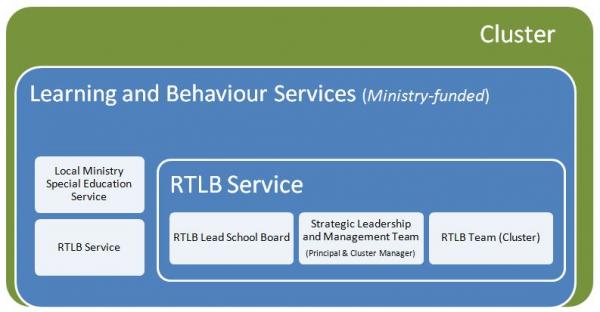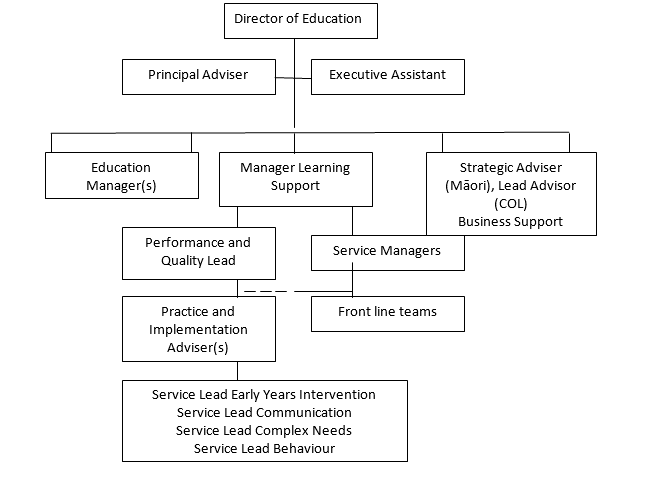How the service is organised
Clusters
Nationally, all State, State Integrated, and Partnership kura and schools are grouped into 40 clusters who are able to access support from RTLB.
One school in each cluster (lead school) provides the service to, and on behalf of, all schools in the cluster.
RTLB service organisation

Note: RTLB are not funded to provide the service to Independent, Private, Special schools, or Home Schooling.
Learning and behaviour services
The Ministry of Education funds the following learning and behaviour service.
- The RTLB service
- Students with learning support needs – details types of services and aid available for children, students, teachers, and schools
RTLB lead school principals' executive group
A representative group of RTLB lead school principals meet each term with Ministry National Office staff to discuss RTLB related matters. The group is elected by their peers at the annual RTLB National Forum.
RTLB lead schools
Nationally, there are 40 lead schools for the RTLB service. Lead school boards:
- provide governance and strategic direction for the RTLB service in their area
- ensure processes and systems are in place so that a high quality RTLB service is provided to all schools in the cluster
- delegate the leadership and management of the service to the lead school principal and the cluster manager.
RTLB clusters
RTLB Clusters are groups of itinerant fully-registered specialist teachers who hold a current practicing certificate who have the training and skills to provide the RTLB service. RTLB work with teachers and schools to find solutions that support students with substantial barriers to learning and build teacher and school inclusive practice capability.
Each cluster has an allocated number of RTLB positions and has a professional leadership structure led by the cluster manager and supported by practice leaders that ensures all RTLB provide an effective, quality service to cluster schools.
Learning support specialist services
In 2017 the Ministry aligned the previous 16 Special Education Districts with the ten regions of Education, each with a Director of Education.
The ten regions include the positions of Principal Adviser, Manager(s) of Learning Support, Performance and Quality Leads, and Practice and Implementation Advisors.
While there are some regional variations, the general structure of each region is as follows.

Collaboration with Ministry staff
The quality of learning support provision to students, schools, kura, clusters, and Kāhui Ako relies on the establishment and maintenance of respectful working relationships.
Relationships include:
- The RTLB Lead School Principals’ Executive and Ministry, the National Director Learning Support, Ministry Resourcing, Infrastructure, and Payroll.
- Lead School Principals, Ministry Directors of Education, Managers of Learning Support, Education Managers, and Kāhui Ako Lead Principals.
- RTLB Cluster Managers, Ministry Service Managers, Learning Support Facilitators.
Working in equal partnership to:
- establish and maintain one system of learning support access and provision
- sharing expertise and resources
- solve problems.
A two way exchange of open and honest communication to:
- share data, information, thoughts, and ideas
- seek to reach mutual understanding and agreement on the views of each party
Content last updated: March 2018